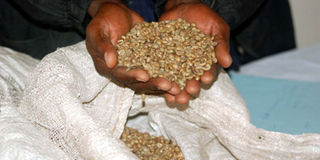Training gives farmers hope on improving coffee quality

Training farmers on better post-harvest practices would enable them get better prices of their coffee as it would meet industry standards. Photo by Edgar R. Batte
What you need to know:
Moving the smallholder farmers to actively participate in the market for their crops in addition to production is the objective of this project.
In 2002, David Kimbugwe met a coffee farmer and got chance to ask him why he had gone ahead to plant coffee that season despite the slump in prices.
He told him that more people were not growing because they feared losses, so he wanted to take a chance. Kimbugwe was fascinated, first, because he was running a family business dealing in coffee, and by the determination of this farmer. He continued running the family business and began saving too, preparing himself for when he would strike out on his own.
Training farmers
When he finally did, in 2010, he did not go into farming but supporting farmers through buying their produce. “I started by buying one ton, then two to five tonnes,” he recalls.
He saw another opportunity which was sorting and grading coffee. He bought the machine to do this, valued at Shs25m for his Bulema Coffee Factory, in Kasana, Luweero.
“In the first season, I was able to make Shs38m here (Kasana) and also went and sorted coffee in Masaka where I made Shs25m,” he explains. “Usaid–Lead advised me to recruit buying agents in the villages and they trained them in the coffee trade parameters. I have 16 agents all of whom now know the quality of coffee I buy. They, in turn, have trained the farmers who supply me with coffee. With Usaid-Lead facilitation, I now amplify my efforts on radio, talking about coffee farming to coffee farmers, I cost-share the radio show with them ”, Kimbugwe adds.
The Usaid-Lead project aims at reducing the poverty of smallholder farmers by expanding their active participation in market channels for coffee, maize and beans that provide market information, technical support and attractive prices for better quality products. From the savings Kimbugwe was able to pay rent of Shs3.5m for the land where his factory is located. He was also able to buy land at Shs16m, where he plans to relocate his factory.
Kimbugwe will need a loan to achieve this. He says loans are a necessity in business and says he has acquired loans before but the reason he has managed to pay them diligently is to use the loan for the reason for which you got it.
This has been Asiimwe-Mwesigye Mpanga’s challenge. The director of Mpanga-Kyihango Coffee Factory, in Mitooma District in western Uganda, says that the time banks give farmers to pay back the loans is too short.
Focus of interventions
Usaid-Lead has come out to train farmers on how to grow coffee but also linking them to financial institutions. Ronnie Ntambi, a Communications Consultant, explains their focus of interventions.
“The majority of Robusta coffee farmers sell dried coffee cherries (kiboko), which traders then hull to extract the green beans to be sold through to graders and exporters. For the sale of green beans, the coffee industry has well-developed quality parameters and pricing strategies that reward better quality and penalise for high moisture, foreign matter and presence of black and other unsound beans,” he says.
Production and post-harvest
Ntambi adds, “Coffee farmers, by and large, fall outside this system of rewards and penalties and, as a result, have limited incentive to improve production and post-harvest practices that will improve coffee quality and earn them a price commensurate with their efforts.”
A kilogramme of coffee in Mitooma costs Shs4,500 which gives farmers a fairly good income as Laban Bakyegyesa, a farmer in Mitooma explains. “I grow coffee on 3.5 acres of land from which I can harvest up to 20 bags in a good season. From these bags I can make a profit of Shs3.5m shillings but it’s because I heed advice from Usaid-Lead who emphasise during trainings that good quality coffee will yield good prices.”
Industry standards
“We have also been trained to identity opportunities in harnessing good trading norms and standards of the coffee industry and benefit from those incentives,” Asiiimwe explains, adding that this helps them produce coffee that meets recognised industry standards. They can also attract better prices.
According to the Uganda Coffee Development Authority monthly report for August, the year-on-year cumulative coffee exports for the period September 1, 2011, to August 31, 2012, totalled 2.89 million bags worth $417m (Shs1.2tn) comprising of Robusta (2.05 million bags) and Arabica (0.84 million bags).




